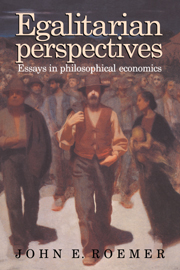Book contents
- Frontmatter
- Contents
- Acknowledgments
- List of sources
- Introduction
- Part I Exploitation
- Part II Equality of resources
- Introduction to Part II
- 6 Equality of talent
- 7 Egalitarianism, responsibility, and information
- 8 A pragmatic theory of responsibility for the egalitarian planner
- Part III Bargaining theory and justice
- Part IV Public ownership and socialism
- References
- Index
6 - Equality of talent
Published online by Cambridge University Press: 23 December 2009
- Frontmatter
- Contents
- Acknowledgments
- List of sources
- Introduction
- Part I Exploitation
- Part II Equality of resources
- Introduction to Part II
- 6 Equality of talent
- 7 Egalitarianism, responsibility, and information
- 8 A pragmatic theory of responsibility for the egalitarian planner
- Part III Bargaining theory and justice
- Part IV Public ownership and socialism
- References
- Index
Summary
Introduction
If one is an egalitarian, what should one want to equalize? Opportunities or outcomes? Resources or welfare? These positions are usually conceived to be very different. I argue in this paper that the distinction is misconceived: the only coherent conception of resource equality implies welfare equality, in an appropriately abstract description of the problem. In this section, I motivate the program which the rest of the paper carries out.
Welfarism versus resourcism
Although not popular among economists, nonwelfarist theories of distributive justice have become prevalent in political philosophy since 1970. “Welfarism,” a term coined by Amartya Sen (1979b), is the position that the social choice function should have as its arguments the individual utilities of members of the society. The optimal income distribution, or most desired state of the world, is the one that maximizes the value of that function. The most classical of welfarist approaches is utilitarianism, which takes the welfare functional to be the sum of individual utilities, and therefore recommends that distribution of social resources which maximizes total utility. A second example, the egalitarian welfarist functional, recommends a distribution of resources which equalizes utilities of all individuals – or comes as close to it as possible. (The social welfare functional is, in this case, set equal to the minimum utility level in the population – maximizing it equalizes all utilities, absenting incentive problems of redistribution. The “maximin utility” solution is not to be confused with Rawls's proposal, on which more below.)
- Type
- Chapter
- Information
- Egalitarian PerspectivesEssays in Philosophical Economics, pp. 119 - 147Publisher: Cambridge University PressPrint publication year: 1994
- 1
- Cited by



